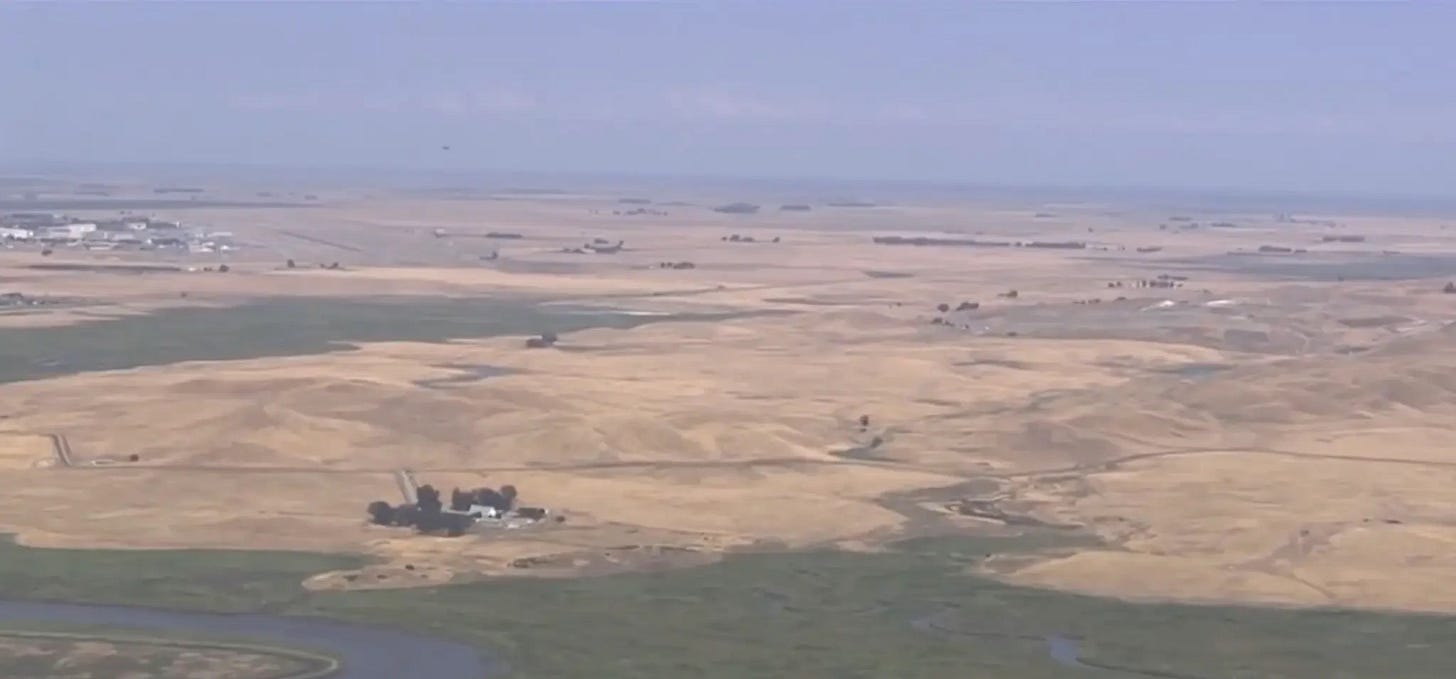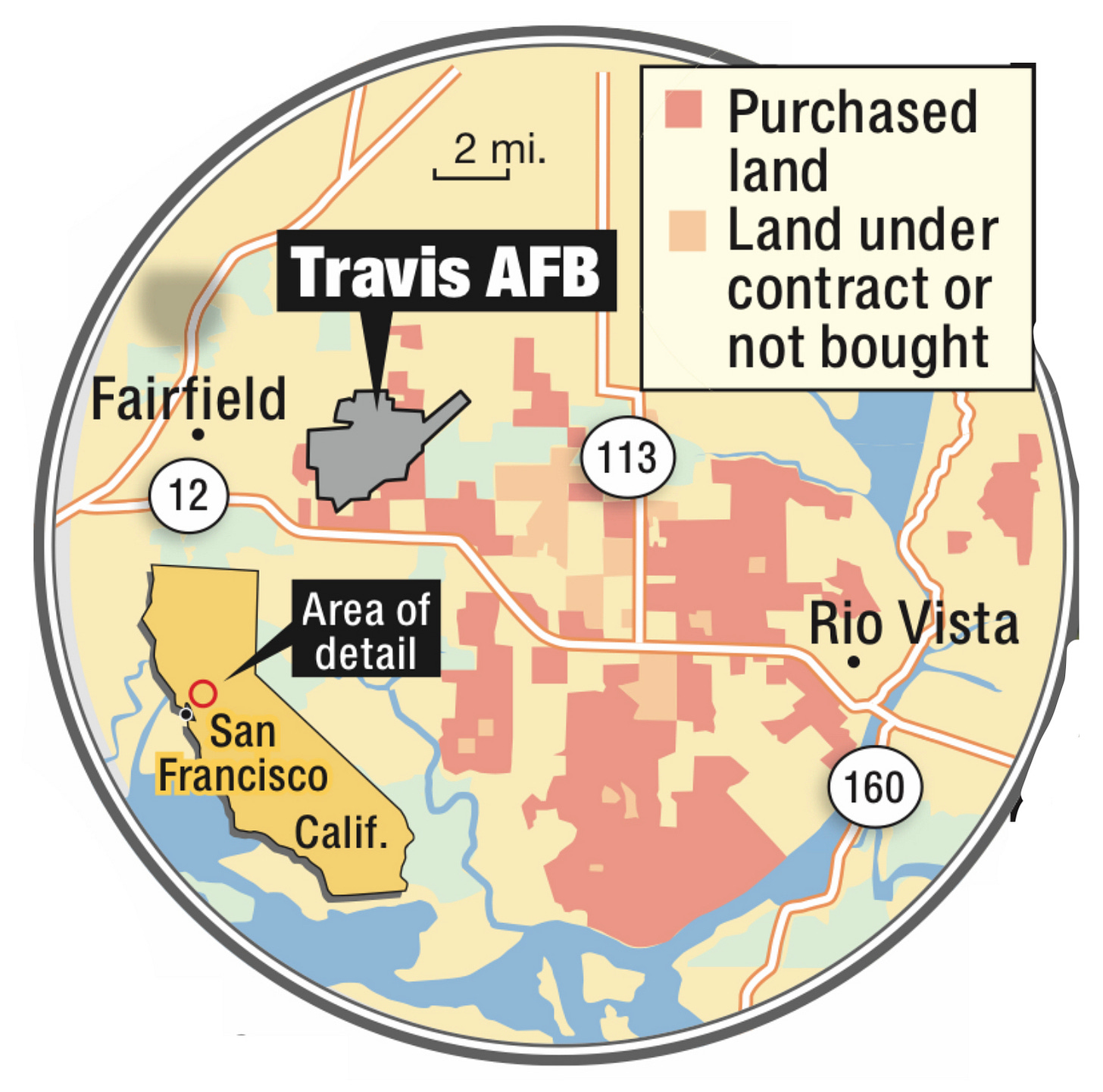"You Don't Own That!"
Have you read about the Silicon Valley billionaires buying up a whole bunch of desert land in Solano Valley, CA? Apparently, there's a "vision" of a sustainable, pedestrian-friendly city percolating in a few Big Brains, and they've put together a legal entity, Flannery Associates, to take the first steps, i.e. buy up the land they need for this endeavor.
Naturally, lots of people who aren't risking any of their own money on the project have something to say about it. No matter that the location is described by local officials as "mostly dry, inhospitable farmland beset by harsh winds, turbines, and abandoned gas wells." Local pols are miffed that a lot of the land Flannery has either already bought or is in contract to buy is near Travis AFB, and early secrecy spurred since-refuted fears that the Chinese were buying up land close to a US military installation.
The thing that tickled me about this was the mention that much of the land purchased is zoned for agricultural, not residential, use.
Many moons ago, when I mentioned in a conversation that zoning laws, especially excessive ones, are a violation of property rights, someone retorted "you'd be OK with a chemical plant next door to your house?" Cheap rhetorical gambit, of course, as a reductio ad absurdum, as an absolutist gag, and ignoring the reality that zoning laws are not a yes/no proposition. Alas, most who don't like libertarianism play this card all the time, which makes them look infantile and makes us throw our hands in the air in frustration. As with everything else in the real world, change would be incremental, and I should be able to point out when I believe zoning laws are restrictive and harmful and impediments to progress without being accused of wanting to bury corpses in a schoolyard.
People love zoning laws when they bend others' property uses to their will. People hate them when they want to do something with their property that others object to. The libertarian purist in me bristles at them, but as with public education, public roads, the welfare state, and countless other coercions, the rest of me knows they're not going away, so they should be managed rather than raged at.
One of the problems with zoning is that it's "government," and government is a drag far more than it is a facilitator, enabler, or promoter. Laws and regulations are permanences - standing forever unless dislodged by new laws and regulations. So, when conditions change, e.g. waterfront industries in big cities migrate out, existing zoning laws can (and usually do) hinder redevelopment and repurposing of the land that those factories, warehouses, piers, and other structures sat upon. An on-going example of this is born of the work-from-home boom prompted by the COVID pandemic, with office space lying fallow all over cities like New York, and zoning restrictions preventing those structures from being converted to much-needed residential housing.
Zoning does get changed, from time to time, but that process is, as one might expect, highly politicized, with countless rent-seekers, do-gooders, know-it-alls, Luddites, preservationists, and other not-the-actual-owners parties demanding their two cents be incorporated. So, the process takes time, requires effort, and consumes political capital. And frequently stalls out. Meanwhile, the owners of fallow property continue to be charged property taxes, of course, and the government, much like the Mafia, helpfully tells the landlord, "***k you, pay me."
Government reminds us that "you don't own that!" in myriad ways:
Zoning laws.
Rent control laws.
Eminent domain seizures for the purpose of private development.
"Rental inspections," aka warrantless searches.
Municipal fines, aka "policing for profit," where the government charges us for using our property in a manner it does not like.
Squatters' rights, where the government enforces another's seizing of control of your property.
Civil asset forfeiture, where the burden of proof protocol is flipped on its head.
Restrictions on free enterprise. You should be able to sell anything you can give away freely, but any of us can list dozens, if not hundreds, of examples where government won't let us do so.
Occupational licensing.
Land use permitting.
That's just a short list. If you've got a favorite I didn't mention, drop it in the comments.
Then, there's property taxes.
As I've blogged before, I'm not an anti-tax absolutist. I divide taxation into two forms: fee-for-service, and everything else. Fee-for-service is just that - you pay for goods and services provided to you. We can (and do) argue about how that fee-for-service should best be collected and managed, but the underlying principle remains. The "everything else" is mostly government collecting from Peter to give to Paul, and there is no defense of this in any society where one owns one's self and the fruits of one's labor.
Some portion of property tax can be considered "fee-for-service," since most property is served by infrastructure of some sort. A lot of it, however, is used to fund government activities that are decidedly not fee-for-service. Woe be unto anyone who doesn't buck up to the town or county as it demands - the property can be seized and sold off right from under you for unpaid taxes, and to cover the expenses of the seizure and sale. In most places, if there's anything left, you do get it, but the government (just like a bank that has foreclosed on a defaulted mortgage) isn't going to make much effort to get market value. Its only concern is getting its money, and if your property is sold off for 60% of its market value to a bottom-feeder, good luck arguing that you were subject to an unjust "taking" per the Fifth Amendment.
I will reiterate, I'm not going to bother arguing for a total wipeout of zoning laws. Property law in America isn't advanced or sophisticated enough at this time to handle such a slashing of the Gordian knot, and incrementalism is both the better approach and the unassailable reality. We need a restoration of property rights, and dialing back zoning restrictions should one of many fronts in that effort.
We can start by saying that if a bunch of billionaires want to spend their own money building a city in a swathe of desert, more power to them.
There was another time that a town got built in the desert near a military base. It’s now called Las Vegas.




Excellent Peter. My head hurts thinking of all the non fee for service taxes we are subject to
“People love zoning laws when they bend others' property uses to their will. People hate them when they want to do something with their property that others object to. The libertarian purist in me bristles at them, but as with public education, public roads, the welfare state, and countless other coercions, the rest of me knows they're not going away, so they should be managed rather than raged at.”